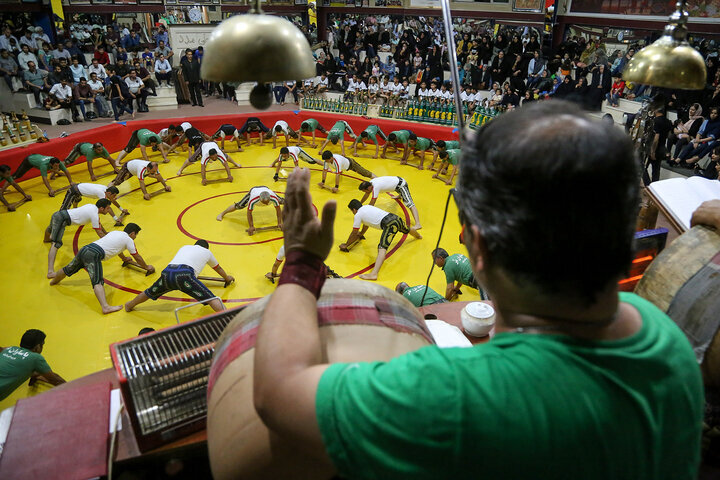Source of inspiration: Iran’s Pahlevani and Zoorkhanei rituals

TEHRAN– So far, a wide variety of Iranian elements have gained a place on UNESCO’s list of the Intangible Cultural Heritage of Humanity aimed at protecting the cultural achievements of mankind.
Named a UNESCO heritage in 2010, Pahlevani and Zoorkhanei rituals are one of those elements long been a source of inspiration for other nations.
It is interesting that a similar element, which is practiced in Azerbaijan, gained UNESCO status last week at the 17th session of the Intangible Cultural Heritage Committee held in Morocco.
In that regard, Mostafa Pourali, who is in charge of cultural heritage protection, says: “The newly registered case just indorses the Iranian tradition.”
“From the perspective of the UNESCO Convention in the field of intangible cultural heritage, the fact that the Republic of Azerbaijan has registered an element similar to an Iranian case does not harm Iran’s case. Moreover, it further promotes Iran’s intangible cultural heritage.”
Pourali made the remarks in response to a question about whether the new registration overshadows the previously inscribed element or not.
“The Islamic Republic of Iran officially registered its Pahlevani and Zoorkhanei ritual in 2010 on UNESCO's World Intangible Cultural Heritage List,” he said.
“There are different types of Pahlevani wrestling in Iran, for instance: Gile-Mardi wrestling…Due to the limitations of UNESCO in allocating quotas for each country, it is appropriate to register all these cases in a file with a comprehensive title, which, thank God, Iran has done this important step 12 years ago,” the official explained.
Elsewhere in his remarks, Pourali emphasized that “Azerbaijan's case is national.” According to UNESCO directions, any country may register its intangible cultural elements and this does not conflict with (similar) elements registered by other countries, he added.
The official emphasized that the intangible heritage is alive and belongs to all the people who practice it. “Inscribing an element on the Intangible World Heritage list does not create ownership for any country.”
“Pahlevani wrestling and Zoorkhanei rituals, whose international federation is based in Tehran, are emerging in many countries. It is a source of pride that an Iranian cultural element is alive in other lands. For example, Uzbekistan can do this in the coming years,” the official said.
“Therefore, Azerbaijan will not become the owner of that element by registering its martial culture. From UNESCO's point of view, proving that an element was first created in which country and later transferred to another country does not have any rights or privileges for the country of origin,” the official said.
“Because the intangible heritage moves to every part of the world by its supporters and performers. This way, all countries have the chance to register intangible heritage that is alive in their lands.”
Pourali said countries registered their intangible heritage both independently and jointly. “However, UNESCO encourages countries to compile a common file. But there is no obligation that, for example, Azerbaijan has to join Iran’s case.”
According to the UN cultural body, Pahlevani is an Iranian martial art that combines elements of Islam, Gnosticism, and ancient Persian beliefs. It describes a ritual collection of gymnastic and callisthenic movements performed by ten to twenty men, each wielding instruments symbolizing ancient weapons.
The ritual is held in a Zoorkhane, a revered dome-shaped building with seats for spectators and an octagonal, submerged arena. The Morshed (master) who leads the Pahlevani ritual performs epic and Gnostic poems and beats out time on a Zarb goblet drum. The poems he recites transmit ethical and social teachings and constitute part of Zoorkhanei literature.
Participants in the Pahlevani ritual may be drawn from any social strata or religious background, and each group has strong ties to its local community, working to assist those in need.
During training, students are instructed in chivalric and ethical values under the supervision of a Pishkesvat (champion). Those who master individual skills and arts, observe religious principles, and go through the ethical and moral stages of Gnosticism can attain the pre-eminent rank of Pahlevani (hero), signifying rank and authority within the community.
As mentioned by UNESCO, Pehlevanliq culture in Azerbaijan includes games and sports, such as wrestling and individual performances. Pehlevans use specific tools that resemble medieval weapons (such as swords, shields, and bows), but are heavier (originally, to allow Pehlevans to handle real weapons easily).
Some 500 Zoorkhanes exist right now in Iran, each with practitioners, founders, and senior athletes.
AM
